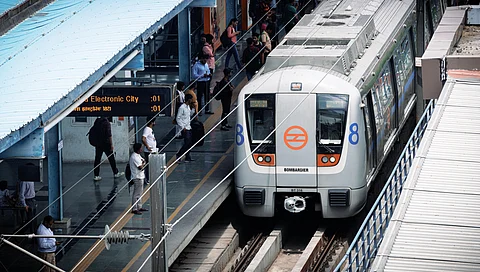
- Destinations
- Experiences
- Stay
- What's new
- Celebrating People
- Responsible Tourism
- CampaignsCampaigns
- SubscribeSubscribe
- Buy Now

Delhi Metro Rail Corporation will introduce the country’s first three-coach train service on the eight-km Lajpat Nagar to Saket G Block corridor as part of its Phase IV expansion, among a raft of announcements that have been made this week.
The corridor will have eight stations and will be the second shortest line on the Delhi Metro network after the Grey Line. The new stretch is expected to open by 2025 and is projected to serve 60,000 to 80,000 passengers daily in the initial phase.
The Delhi Metro Rail Corporation (DMRC) has introduced a smaller train configuration for this corridor to suit short-distance travel needs in the city. “Unlike most metro lines that use four, six or eight-coach trains, this innovative three-coach system has been developed to cater specifically to short-distance urban travel. The smaller train configuration will provide a cost-effective and agile solution, ensuring better frequency and operational efficiency while accommodating a substantial number of daily commuters,” said Anuj Dayal, principal executive director of corporate communications at DMRC.
The corridor will extend the Golden Line and pass through Lajpat Nagar, Andrews Ganj, Greater Kailash 1, Chirag Dilli, Pushpa Bhawan, Saket Court, Pushp Vihar and Saket G Block. It is expected to improve accessibility to residential and commercial hubs in South Delhi.
The Lajpat Nagar station will become a triple interchange hub connecting the Pink and Violet Lines. Chirag Dilli will link with the Magenta Line, and Saket G Block will offer interchange access to the airport.
Each three-coach train will accommodate around 900 passengers per trip. With future enhancements in train frequency, ridership is expected to exceed 1.2 lakh daily by 2041.
The DMRC is also focusing on environmental and economic sustainability with this initiative. A smaller train format means lower energy consumption per trip, making it an environmentally responsible and financially prudent decision, said an official.
The Lajpat Nagar-Saket corridor is one of three corridors under construction as part of DMRC’s Phase IV expansion. Other corridors include Janakpuri West to RK Ashram (extension of the Magenta Line), Majlis Park to Maujpur (extension of the Pink Line) and Aerocity to Tughlaqabad (Golden Line). These three new corridors span a total of 65 km.
The Majlis Park to Maujpur corridor is expected to be completed by 2025, while the other two corridors are scheduled for completion by 2026.
Delhi Metro commuters will now be able to book bike taxis and auto-rickshaws for first- and last-mile connectivity, along with metro tickets, in a single transaction.
The DMRC has introduced this feature through its DMRC Sarthi-Momentum 2.0 app, which aims to streamline urban commuting by eliminating the need for multiple bookings. This feature was developed in collaboration with Autope Payment Solutions Ltd., and DMRC has partnered with Rapido for bike taxis and auto-rickshaws. The service also includes SheRyds, a women-led startup offering bike taxi services exclusively for female commuters.
Users enter their destination and the app suggests the nearest metro stations along with available first- and last-mile transport options.
A bike taxi or auto-rickshaw is booked for pickup from the user’s location to the nearest metro station.
Before reaching the destination station, another ride is automatically booked for last-mile travel. If the metro station is within walking distance, the app does not suggest a vehicle. A walking navigation feature is planned for future updates.
(With inputs from multiple news reports)
